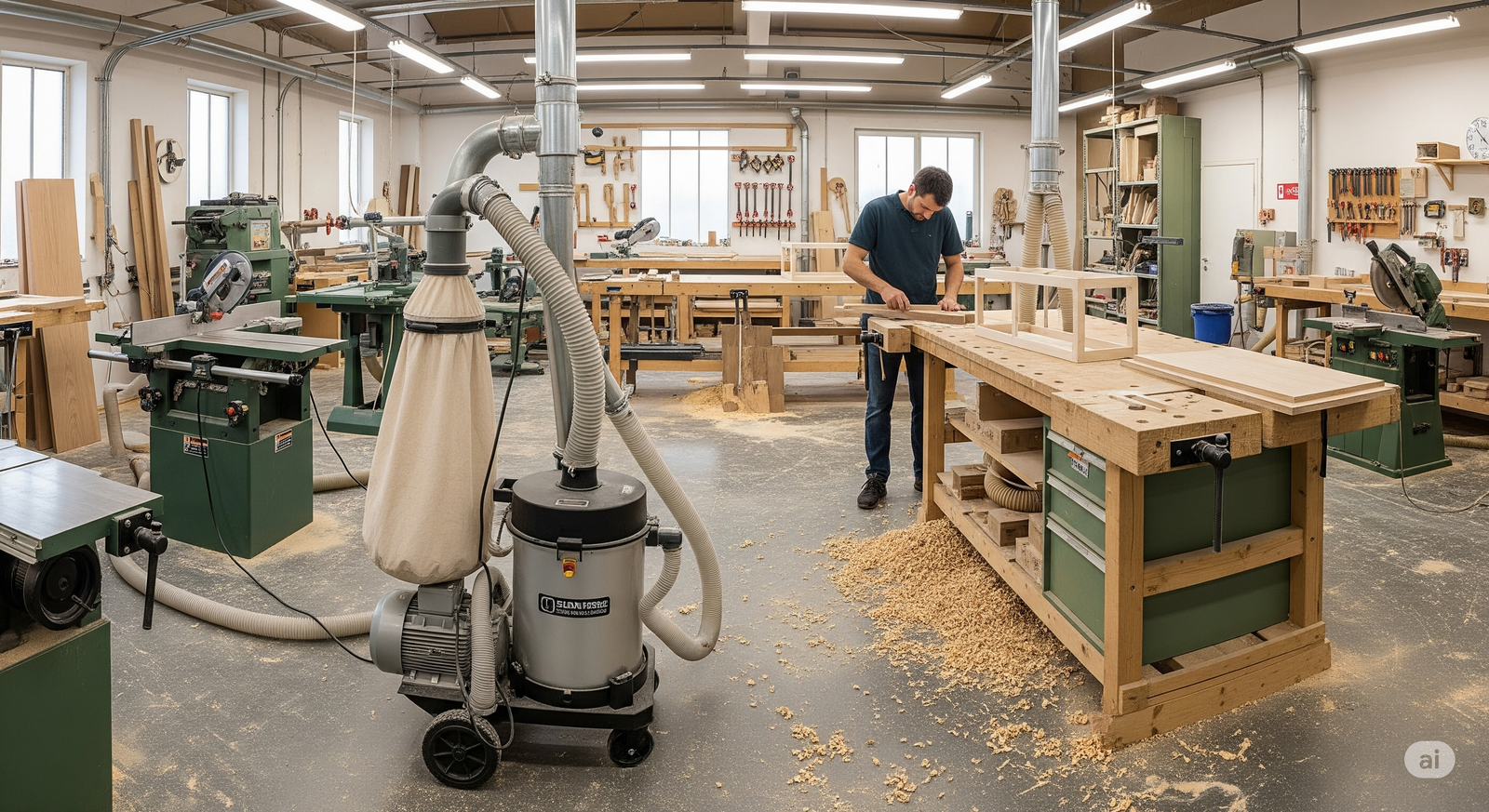What is a Woodworking Dust Extractor?
A woodworking dust extractor is an industrial device that removes wood dust and debris from the air in a workspace. It uses a combination of suction power, filters, and collection systems to extract particles at the source. Whether you’re operating a large CNC router or a small table saw, a dust extraction system is critical to ensure clean air, reduce fire risks, and improve machine longevity.
How Does It Work?
Most woodworking dust extractors work by pulling air through ducts attached to woodworking machinery. The air, carrying wood dust and chips, is passed through various stages of filtration:
- Primary collection: Large chips and particles are separated using a cyclone or bag collector.
- Secondary filtration: Fine dust is filtered using cartridge or HEPA filters.
- Air discharge: Clean air is either released back into the workspace or vented outside.
Types of Woodworking Dust Extractors
There are several types of woodworking dust extractor systems, each suited to different operations:
1. Portable Dust Extractors
Ideal for small workshops or single-tool connections. They are compact and easy to move.
2. Wall-Mounted Units
Great for saving floor space, usually connected to one or two machines.
3. Cyclone Dust Extractors
Use centrifugal force to separate large particles before filtration, improving filter life.
4. Centralised Dust Extraction Systems
Designed for large facilities, connected to multiple woodworking machines through a central ducting network.
Key Features to Look For
When choosing a woodworking dust extractor, consider the following features:
- Airflow capacity (CFM or m³/h): Determines how much air the system can move.
- Filter efficiency: HEPA or fine cartridge filters capture even microscopic dust particles.
- Dust collection capacity: Larger bins or bags require less frequent emptying.
- Noise level: Essential for indoor or shared workshop environments.
- Automatic start/stop: Triggered by tool operation for energy efficiency.
- Build quality and portability: Depending on your workspace and mobility needs.
Applications in the Woodworking Industry
Woodworking dust extractor systems are used across a wide range of settings, such as:
- Cabinet making
- Furniture manufacturing
- Sawmills and timber processing
- Educational institutions
- Joinery workshops
- Wood turning and carving studios
- Composite wood panel production
Cost of Woodworking Dust Extractors
The cost of dust extraction systems varies based on size, type, and filter capability:
| Type of Extractor | Approximate Price Range (UK) |
|---|---|
| Portable Single-Tool Extractors | £200 – £600 |
| Wall-Mounted Units | £500 – £1,200 |
| Cyclone Dust Extractors | £800 – £3,000 |
| Centralised Multi-Machine Systems | £5,000 – £25,000+ |
Prices may also include ductwork, installation, replacement filters, and annual maintenance plans. Investing in a quality system ensures reduced downtime and increased workshop efficiency.
Locations & Availability in the UK
In the UK, woodworking dust extractors are widely available and supported in major cities such as:
- London – Ideal for high-end joinery and commercial workshops.
- Birmingham – Central hub for manufacturing and furniture production.
- Manchester – Home to numerous industrial suppliers.
- Leeds & Sheffield – Known for carpentry, interior fit-outs, and CNC machining services.
- Glasgow & Edinburgh – Strong woodcraft and design communities.
- Bristol & Cardiff – Ideal for small-scale artisan workshops and production units.
Most suppliers offer nationwide delivery and on-site consultation services, and many UK-based workshops source from both domestic and international woodworking dust extractor manufacturers
Maintenance Tips
Regular maintenance ensures optimal performance and longevity of your woodworking dust extractor:
- Clean or replace filters regularly.
- Check and seal ductwork to prevent air leaks.
- Empty collection bins to prevent clogging.
- Inspect motors and fans for abnormal noise or vibration.
- Schedule annual servicing for centralised systems.
Regulatory Compliance in the UK
In the UK, woodworking operations fall under strict health and safety regulations:
- COSHH (Control of Substances Hazardous to Health) mandates the use of dust extraction for harmful wood dust.
- Employers must measure and monitor air quality regularly.
- Dust extractors must meet British Standards for filtration efficiency and workplace safety.
Using a certified woodworking dust extractor manufacturers ensures compliance with these legal and environmental requirements.
Environmental Benefits
Dust extraction doesn’t just protect workers—it benefits the environment too:
- Reduces airborne pollutants in industrial areas.
- Improves energy efficiency by preventing system blockages.
- Reduces cleanup time, allowing for better workflow and productivity.
- Promotes sustainable operations by collecting reusable wood shavings for recycling or fuel.
Industry Trends & Innovations
With advancements in filtration and automation, modern woodworking dust extractor systems are smarter and more efficient than ever:
- Smart sensors detect dust levels and optimize fan speeds.
- IoT-enabled units allow remote monitoring of system performance.
- Compact modular units offer scalable solutions for growing workshops.
- Noise reduction tech improves the working environment in urban or indoor settings.
Conclusion
A woodworking dust extractor is an indispensable investment for any UK-based woodworking operation, from small studios to large-scale manufacturing units. It improves air quality, enhances worker health, extends machinery life, and keeps operations compliant with UK laws.
Thanks to leading woodworking dust extractor manufacturers, you can now find high-performance systems tailored for every type of woodworking application, budget, and scale. Whether you’re building bespoke furniture in Birmingham or running an industrial panel line in Manchester, a reliable dust extraction system is your workshop’s best ally.

